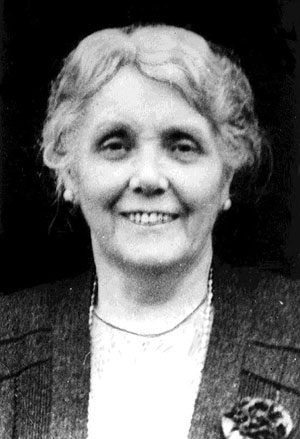Catherine Hogg Blair 1872-1946
Suffragette, artist and founder of the Scottish Women's Rural Institute
Catherine was an East Lothian farmer's wife, a mother of four, and a member of the Women's Social and Political Union (WSPU). Her guiding principle in all her undertakings was a strong commitment to democracy and equality. This led her to found the Scottish Women's Rural Institute (SWRI) which gave rural women an opportunity to meet, discuss, and develop social networks and to learn new skills through a mixture of talks and practical demonstrations.
Demonstrations on pottery painting inspired Catherine to establish the Mak' Merry pottery. In keeping with the founding principles of the SWRI some members attended embroidery and pottery painting courses which enabled them to pass on what they had learned to other members. The pieces they produced were designed not only to brighten up their cottages but also to provide a much needed source of income.
As a member of the WSPU Catherine used her considerable literary and oratory skills to address public meetings, and maintained a steady stream of articles and letters to the Scottish press in support of the suffragettes' cause and tactics. She provided refuge at her farm house at Hoprig Mains near Tranent for weakened hunger-striking suffragettes when they were released from prison under the Cat and Mouse Act: many of them had been imprisoned in Calton jail in Edinburgh. She also provided sustenance for the Scottish women as they passed by the farm, heading to London for the large marches.
Catherine and her husband left the farm in 1932, moving to a smaller house in North Berwick. Her later years were no less active: she continued her painting, design and craft activities from her studio. During the War she supported the Red Cross and the Polish Relief Fund. She was also active in education and campaigned for housing improvement and support for the homeless.
In 1940 she published a history of the SWRI entitled Rural Journey. Six years later she died and was cremated at Warriston Crematorium in Edinburgh.
Throughout her life Catherine Blair was deeply committed to helping ordinary, often poor, rural women realise their full potential both in public life and creatively, and through her organising ability and practical support gave many of them the confidence to do exactly that.
Joan Skinner and Kate Neilson
Sources:
Obituary In The Scotsman 19 th November 1946
Blair, Catherine. Rural Journey: A History of the SWRI From Cradle to Majority 1917-1939. Edinburgh: Lothian Print Ltd, 1940 (reprinted in 2004)
Leneman, Leah. The Scottish Suffragettes. National Museums Scotland, 2000
Sharon, Monica. C atherine Blair: Living Her Splendid Best.Scottish Home and Country, December 1987

